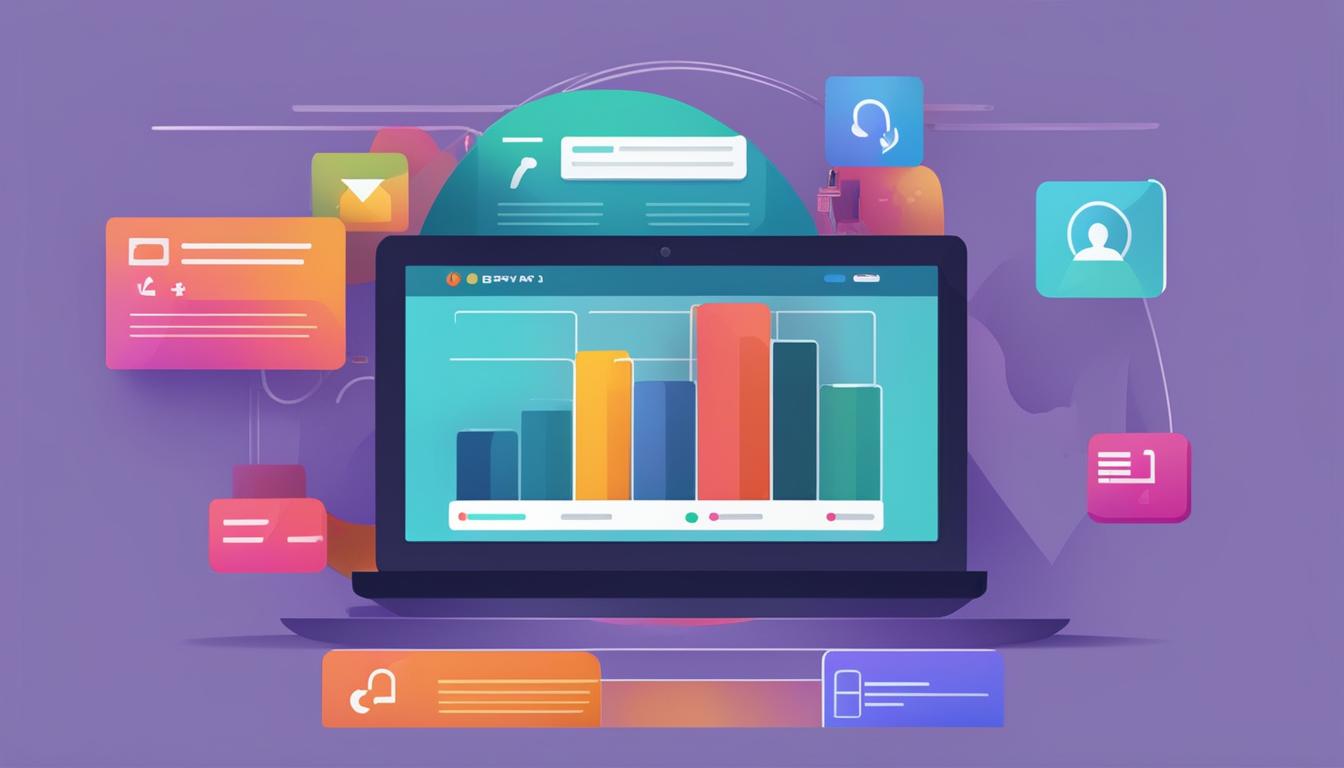The modern customer interaction landscape is undergoing a significant transformation with the advent of customer self service portal software. As businesses steadily move away from conventional methods of customer service, such as direct calls or visits, electronic self-service solutions emerge as comprehensive and efficient alternatives. These platforms encompass a wealth of functionalities – from customer support portal features to mobile apps, kiosks, and social media chatbots. This new breed of self service software optimizes efficiency and enhances customer satisfaction, as it enables users to find answers, manage their accounts and complete a host of tasks autonomously.
Key Takeaways
- Customer self service portal software offers a comprehensive solution for businesses seeking to evolve their interactions with customers.
- These platforms provide numerous channels for customer support, including online portals, mobile apps, kiosks, and chatbots.
- By empowering users to self-serve, businesses can optimize efficiency while delivering an enhanced customer experience.
- Self service software aligns with modern consumer expectations in the digital age and allows businesses to stay competitive.
- Industries such as retail, banking, and healthcare are already leveraging the benefits of customer self service portal solutions to streamline interactions and improve customer satisfaction.
Embracing the Shift to Self-Service in the Digital Age
The transition from traditional customer support models to modern, digital e-service frameworks is a testament to the changing consumer demands in today’s digital age. By embracing various self-service technologies and channels, businesses can provide comprehensive, scalable support that aligns with customer expectations of 24/7 availability. Such support allows companies to deliver seamless and personalized experiences, enhancing customer satisfaction while cutting down support-related costs.
The Evolution from Traditional Support to E-Service
As consumer preferences shift toward digital solutions, businesses are progressively moving from conventional customer service methods to e-service frameworks. This evolution is marked by the increasing adoption of self-service channels like online customer portals, mobile applications, and social media chatbots, which empower customers to resolve issues and access information autonomously without reliance on direct human assistance.
Understanding Self-Service Technologies and Channels
Self-service technologies encompass a broad spectrum of channels, including web self service portals, mobile apps, and social media chatbots. These platforms enable organizations to provide support across various touchpoints, adapting to the diverse needs and preferences of their customers. By offering a wide range of self service portal options, businesses can cater to multiple customer segments, promoting a seamless and efficient user experience.
The Benefits of Offering 24/7 Support Through Self-Service
One of the most distinctive advantages of self-service platforms is the ability to provide round-the-clock support. This translates to shorter wait times, immediate access to information, and a sense of autonomy for customers, all of which contribute to significantly improved customer satisfaction. In addition, self-service channels reduce support-related costs for businesses, helping them optimize their resources and streamline operations.
Customer Self Service Portal Software and its Impact on Business Efficiency
The advent of customer self service software has revolutionized the way businesses handle routine customer interactions. By streamlining these tasks, companies can expand their customer support offerings without the added costs of a larger customer service workforce. This leads to optimized operational expenses and ensures prompt responses to customer enquiries, regardless of volume.
At the core of this transformation lies customer portal software, designed to cater to customers’ needs more efficiently. These platforms offer a range of self-service options that empower customers to resolve issues, access information, and conduct transactions without the need for direct human intervention. The result is a more cost-effective and efficient service model benefiting both customers and businesses.
- Reduced support costs
- Greater scalability
- Increased customer satisfaction
- Elevated brand perception
With the integration of customer service portal functionalities, organizations gain valuable insights into their customer base. This data can be leveraged to refine and enhance customer experiences, facilitating continuous improvement. Moreover, businesses can capitalize on the reduced necessity for manual support, reallocating resources towards more strategic, growth-oriented endeavors.
| Traditional Customer Support | Customer Self Service Portal Software |
|---|---|
| Higher operational costs | Reduced support costs |
| Limited scalability | Greater scalability |
| Long response times | Instantaneous access |
| Restricted availability | 24/7 support |
In conclusion, the impact of customer self service portal software on business efficiency is indisputable. By replacing the need for manual interactions, these platforms offer a powerful tool for scaling customer support, optimizing expenses, and enhancing customer satisfaction. As customer expectations continue to evolve in the digital age, companies adopting customer self service solutions will be poised to meet these changing demands, driving growth and securing a competitive advantage in the market.
Artificial Intelligence and Machine Learning: Driving the Self-Service Revolution
As the self-service trend in customer support rapidly accelerates, the integration of Artificial Intelligence (AI) and Machine Learning (ML) is evolving the landscape of customer interaction. These advanced technologies are playing a crucial role in enhancing problem detection and resolution while significantly minimizing the need for direct human intervention.
The Role of AI in Personalizing Customer Experience
AI-powered self service software enables the creation of intelligent chatbots that simulate conversations with users to deliver prompt, personalized customer experiences. As a result, these chatbots become essential components in customer self help portals, contributing to an overall seamless and tailored user experience. Furthermore, the rapid evolution of AI technologies continues to improve the quality and efficiency of these digital customer interactions.
Machine Learning: Understanding and Anticipating Customer Needs
ML works in harmony with AI to facilitate the analysis of customer behavior and patterns, allowing self service software to better anticipate needs and preemptively address issues. By utilizing ML, businesses can refine their customer service strategies and address customer concerns more effectively, ultimately leading to greater satisfaction rates and long-lasting customer relationships.
Enhancing Problem Detection and Resolution Through Advanced Technologies
As AI and ML become increasingly sophisticated, they are likely to further revolutionize customer self help portals by making them more attuned to the customer’s needs. This ongoing innovation in AI-driven capabilities will lead to a more seamless detection and resolution of customer issues, ensuring the portal’s ease of use for customers. Consequently, businesses that leverage these advanced technologies will be better positioned to adapt and excel in a highly competitive marketplace.
Real-world Applications: Diversity of Self-Service Portal Deployment
Customer self service portal software showcases its versatility across a spectrum of industries, including retail, banking, and healthcare. By implementing self service portal applications and customer support portals, businesses across various sectors have managed to enhance efficiency, accessibility, and customer satisfaction.
In the retail industry, kiosks and mobile apps enable self-checkout and provide access to customer service information, reducing wait times and improving the overall shopping experience. Banking institutions have embraced online banking and virtual assistants to offer secure account management and transaction capabilities, providing customers with convenience and round-the-clock accessibility. In healthcare, patient portals and telemedicine services facilitate access to medical information and remote consultations, connecting patients to care providers irrespective of their physical location.
The following table highlights examples of self-service portal applications within these industries:
| Industry | Self-Service Portal Applications |
|---|---|
| Retail | Kiosks, mobile apps, virtual fitting rooms, self-checkout stations |
| Banking | Online banking, virtual assistants, balance inquiries, fund transfers |
| Healthcare | Patient portals, telemedicine services, appointment booking, prescription refills |
Each instance underscores the significant impact of self-service solutions, allowing for more accessible, efficient, and personalized customer support while improving business operations and customer contentment. The adoption of customer self service portal software has transformed the way businesses interact with their customers, laying the groundwork for a customer-centric future.
Augmented Interactions: Humanizing Customer Service Through Automation
As customer service portals and self-service software continue to dominate the industry, businesses must find the perfect blend of automated efficiency and human expertise to enhance customer interactions. This balance can foster trust, loyalty, and ultimately result in a superior customer experience. One way to achieve this equilibrium is by implementing hybrid support models—a fusion of automation technologies with traditional human interaction to ensure customers feel valued and attended to with personalized care.
Combining Automated Efficiency with Human Expertise
Automated systems can streamline customer service operations and provide quick responses to routine inquiries. However, complex or emotionally sensitive issues still require the human touch to provide empathetic and understanding support. By integrating human expertise alongside automated systems, businesses can create a seamless and efficient customer care experience that successfully caters to customers’ diverse needs.
Building Customer Trust with Hybrid Support Models
Hybrid support models blend the convenience and speed of automation with the warmth and intelligence of human interaction. This allows for an innovative approach to customer care that not only preserves the inherent benefits of automation but also ensures a level of personalized service that customers have come to appreciate. Creating customer trust involves acknowledging their needs and providing the right balance of human touch when it matters most.
Case Studies: Success Stories of Enhanced Customer Interactions
A variety of industries have embraced the potential of combining automated and human customer service solutions, resulting in some remarkable success stories. For example, Gartner, a renowned tech research and consulting firm, integrated a self-service portal alongside live chat and phone support, significantly reducing the resolution time for both simple and complex customer queries, while maintaining a personalized user experience. Telecommunications giant AT&T implemented a similar hybrid model, using a virtual chatbot for basic inquiries and a live agent system for more challenging scenarios. These examples demonstrate the transformative potential of merging automated systems with human expertise for exceptional customer service.
Streamlining Customer Support: Integrating Self-Service Software in Various Industries
As businesses adapt to an increasingly digital landscape, the integration of self-service software offers notable advantages across various industries. These solutions not only streamline customer support by providing convenient and autonomous options but also yield invaluable insights into customer preferences, allowing businesses to tailor their services and foster sustained customer loyalty. Three key industries that have benefited significantly from the implementation of these technologies include the telecom, retail, and healthcare sectors.
Telecom Sector: Scaling Support with Self-Service Software
In the telecom industry, customer portal software enables providers to scale their support systems with ease. By allowing customers to access account information, service updates, and troubleshooting guides through an online customer portal, telecom companies can manage customer inquiries more efficiently while reducing operational costs.
Retail Transformation: The Convenience of Kiosks and Apps
Retail businesses have witnessed significant transformation with the introduction of self-service portals such as kiosks and mobile apps. These technologies empower customers to handle tasks like checking inventory, placing orders, or completing transactions autonomously, providing enhanced convenience and efficiency. The ability to track customer interactions through these systems also enables retailers to gain valuable insights and optimize their offerings accordingly.
Healthcare Accessibility: Remote Consultations and Patient Portals
Self-service technologies have dramatically improved accessibility in the healthcare sector. The development of patient portals and the expansion of telemedicine have granted patients greater control over their healthcare information and needs. Patients can now book appointments, access medical records, and even consult with healthcare professionals remotely, saving time and improving overall patient satisfaction.
In conclusion, the integration of self-service software into various industries has evident advantages. By streamlining customer support through the use of customer portal software, businesses can adapt to evolving customer expectations, improve operational efficiency, and enhance overall client satisfaction. As these technologies continue to advance, it remains crucial for organizations across sectors to capitalize on this innovative approach to foster long-lasting customer loyalty.
The Competitive Edge: How Customer Self Service Portal Software Boosts Business Growth
In today’s fiercely competitive business landscape, customer self service portal software plays a pivotal role in driving growth and maintaining a competitive advantage. By equipping customers with the necessary tools to manage their interactions with businesses independently, companies not only enhance user experience but also realize significant cost reductions.
The ability to address customer inquiries without direct human assistance empowers companies to allocate resources more efficiently, ultimately focusing on strategic initiatives that spur overall business growth. In addition, the invaluable insights generated from self-service interactions enable businesses to sharpen their offerings, delivering a competitive edge by aligning services with evolving customer needs.
Let’s delve deeper into the ways customer self service portal software provides businesses with a competitive advantage, paving the way for growth:
- Cost-efficient customer support: Self-service portals help minimize the need for extensive live support teams, reducing overhead costs while still maintaining high-quality service standards.
- Increased customer satisfaction: Offering customers the autonomy to find solutions at their convenience improves their overall experience and satisfaction with the company, encouraging repeat business and brand loyalty.
- Scalability: By automating a significant portion of customer service processes, self-service portal software allows businesses to serve a growing customer base without incurring high additional costs.
- Data-driven decision-making: Leveraging the data collected from self-service interactions, businesses can gain meaningful insights to tailor their offerings and marketing strategies, effectively targeting customer pain points.
To maintain a competitive edge and drive business growth, companies should consider investing in customer self service portal software. Implementing such software not only results in cost savings but also supports a consistently exceptional customer experience, ensuring companies stay ahead in the ever-changing business landscape.
Designing Your Self-Service Portal: Best Practices for Success
To create an effective self-service portal, businesses should focus on understanding customer needs and preferences, ensuring user-friendly design, maintaining up-to-date and accurate content, and employing promotional strategies to increase adoption and use. By considering these elements, organizations can develop a self-service portal that not only meets customer expectations but also encourages engagement and fosters a sustainable and favourable relationship with their clientele.
Identifying and Understanding Customer Needs
Multiple stakeholders have diverse requirements when it comes to using a self-service portal. Understanding these expectations and preferences are critical to designing a platform that will cater to the needs of everyone involved. This can be achieved through customer feedback, interviews, market research, and regular monitoring of usage trends.
Ensuring User-Friendly Design and Functionality
A critical aspect of a successful self-service portal design is the ease of use for customers. Crafting an intuitive interface, with clear navigation and simplified content is essential. Focusing on accessibility and optimizing for mobile and other devices enables a seamless experience for users across multiple touchpoints.
Maintaining Up-to-Date and Accurate Content
Keeping the content within the portal relevant, accurate, and up-to-date is crucial for continued user satisfaction and utility. Regularly reviewing and updating information, resources, and documentation contribute to the portal’s effectiveness and permeate an image of trustworthiness and reliability for the platform and the brand.
Promotional Strategies to Increase Portal Adoption
Strategic marketing plays a pivotal role in promoting the benefits of a self-service portal to customers, driving adoption, and habitual use. Leveraging diverse promotional techniques, such as email marketing, social media campaigns, and in-app messaging, can effectively communicate the value proposition of the online customer portal to both existing and potential users.
By incorporating these practices in the development and implementation of customer self service software, businesses can create an online customer portal that offers a seamless and enjoyable experience while fostering lasting customer relationships and enhancing brand loyalty.
Conclusion
The self-service portal software movement has indubitably revolutionized how customers interact with businesses and access services, instilling a level of autonomy and convenience that aligns with contemporary digital expectations. As we witness the self service software evolution, the future of customer self service portal software seems vibrant and promising, with ongoing innovations likely to enhance the sophistication and efficacy of these solutions.
Summarizing the Self-Service Portal Software Revolution
Customer self-service portal software has positively impacted various industries, allowing for more efficient, accessible, and personalized customer support. Businesses experience operational efficiencies and improved customer relations by leveraging self-service technologies, ultimately fostering growth and competitiveness in this customer-centric era.
Future Outlook: Innovations on the Horizon
As technology continues to progress, innovative self-service solutions are expected to become even more intelligent, capable, and personalized. Artificial Intelligence (AI) and Machine Learning (ML) will play an increasingly critical role in enhancing and optimizing customer self-service experiences, thereby further revolutionizing the landscape of customer support capabilities.
Takeaways for Businesses Considering Self-Service Solutions
For businesses contemplating the integration of self-service solutions, the benefits are numerous, ranging from improved customer satisfaction and loyalty to reduced operational costs. Embracing self-service technology equips companies to thrive in a rapidly evolving market, populated by customers with ever-changing demands and expectations for exceptional service delivery.
FAQ
What are the key components of customer self service portal software?
Customer self service portal software consists of various tools and channels like online portals, mobile apps, kiosks, and social media chatbots, which allow customers to manage their accounts and complete tasks autonomously. These platforms are often complemented by dashboards, notifications, and live agent interaction when necessary.
How do businesses benefit from adopting self-service technologies and channels?
By implementing self-service technologies, businesses can provide more extensive and scalable customer support solutions that meet customers’ expectations for 24/7 availability. The adoption of these technologies also dramatically reduces wait times and support-related costs, thus enhancing customer satisfaction and overall business efficiency.
What role do artificial intelligence (AI) and machine learning (ML) play in self-service solutions?
AI and ML are driving advancements in customer self help portals. AI-powered chatbots simulate conversations with users to deliver personalized customer experiences, while ML analyzes customer behavior and patterns to anticipate needs and address issues preemptively. These technologies enhance problem detection and resolution, minimizing the need for direct human intervention.
How is self-service software revolutionizing customer support across various industries?
The integration of self-service software has streamlined customer support in sectors like telecom, retail, and healthcare. It helps businesses manage customer inquiries more efficiently, personalize experiences, and gain insights into customer preferences. This not only improves business operations but also fosters sustained customer loyalty.
What are some best practices when designing a self-service portal?
To create a successful self-service portal, businesses should focus on understanding customer needs and behaviors, providing user-friendly design and intuitive navigation, maintaining up-to-date and accurate content, and using strategic marketing methods to promote the portal and its benefits.
How can self-service portal software provide businesses with a competitive advantage?
Adopting customer self service portal software not only enhances user experience but also offers significant cost reductions. It allows companies to allocate resources more efficiently and focus on strategic initiatives. Additionally, the data generated from self-service interactions can be used to refine offerings and align services with evolving customer needs, providing a competitive edge in the market.
Source Links
- https://www.linkedin.com/pulse/self-service-solutions-future-customer-service-wind-is
- https://ts2.space/en/the-future-of-customer-support-integrating-self-service-software-into-your-telecom-business/
- https://www.quadient.com/en/learn/customer-communications/enabling-customer-self-service-and-task-automation








